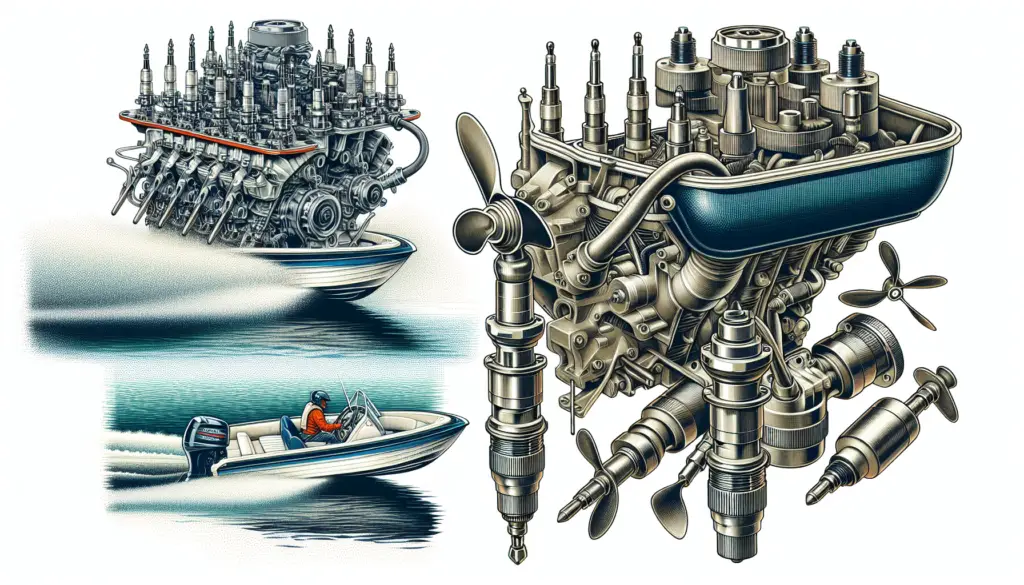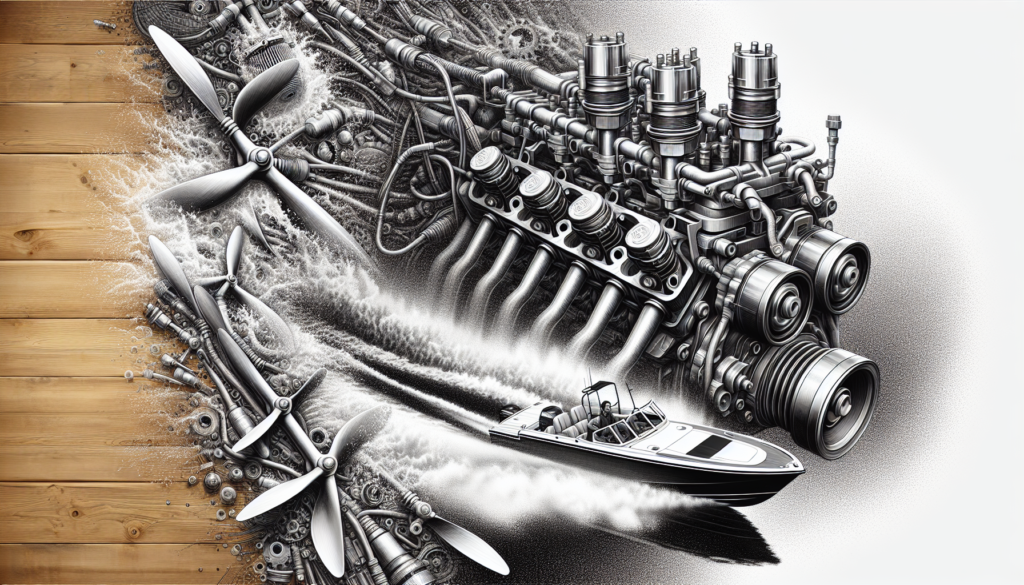This guide is tailor-made for you, a zealous boat owner interested in leveraging your boat’s performance. “How to Optimize Your Boat Engine’s Power and Efficiency” will empower you to unlock the full potential of your boat. The article primarily focuses on various boat engine optimization techniques, potential upgrading ideas, and crucial maintenance tips aimed at improving your boat’s overall efficiency. So, buckle up and ready yourself to explore, learn, and implement this beneficial knowledge into your boating lifestyle.

Understanding the Basics of a Boat Engine
Boating can be a thrilling experience, especially if you understand the heart and soul of your boat: the engine. With essential knowledge on boat engines, you can be able to maximize their power and efficiency.
Components of a Boat Engine
Your boat engine isn’t just a single piece of machinery. It’s made up of several critical components. There’s the block, which is essentially the engine’s skeleton, consisting of a series of cylinders. Next, you’ve got pistons that move inside these cylinders, creating power by compressing fuel and air together. The piston connects to the crankshaft, which converts the piston’s up-and-down motion into rotatory motion, providing power to move the boat. The camshaft controls the opening and closing of the engine’s valves, while the cylinder head seals the top part of the cylinder, enclosing the combustion chamber.
How a Boat Engine Works
A boat engine works on a simple principle; it converts fuel into motion. This process involves several steps: initially, the piston moves downward, drawing air and fuel into the cylinder (the intake stroke). Next, it moves up, compressing the mixture (compression stroke). The spark plug ignites this compressed mixture, causing it to explode and drive the piston down (power stroke). Finally, the piston moves back up again, pushing out the exhaust gases (exhaust stroke).
Different Types of Boat Engines
Boats use two main types of engines: outboards and inboards. Outboards are portable, self-contained units mounted outside the boat’s hull, including the engine, gearbox, and propeller in one unit. They are easy to maintain, steer, and control. On the other hand, inboards are mounted inside the boat, driving a separate propeller shaft. They offer more power and are quieter than outboards, making them ideal for larger boats.
Importance of Regular Boat Engine Maintenance
Like any other kind of engine, regular maintenance can dramatically extend the life of your boat engine, keep it running at peak performance, and prevent serious, costly damage.
Extending the Engine’s Lifespan
Regular maintenance can significantly extend your engine’s lifespan. Simple things such as regular oil changes, frequently checking and replacing damaged or worn-out parts, inspecting and cleaning the fuel system, and keeping the engine clean can dramatically prolong the life of your engine.
Maintaining Peak Performance
Your boat engine’s performance can significantly dip if not adequately maintained. Regular engine maintenance ensures that all parts are working efficiently, leading to peak performance. It helps to ensure that your engine delivers the maximum power and remains fuel-efficient.
Preventing Serious Damage
A well-maintained engine is less likely to break down or suffer serious damage. Regular checks can help you identify potential issues before they become problems, such as leaks or worn parts that need replacement.
Understanding Fuel Types and Their Effects on Engine Performance
Fuel is the lifeblood of your boat’s engine; knowing the right kind to use can dramatically improve performance.
Types of Fuel
There are two main types of fuel used in boat engines; gasoline and diesel. Gasoline is the most common type of fuel and is used in most small to medium-sized boats. Diesel, on the other hand, is used in larger boats and offers more energy per gallon than gasoline.
How Fuel Type Affects Engine Performance
The type of fuel you use in your boat’s engine can significantly affect its performance. Diesel engines are usually more fuel-efficient than their gasoline counterparts. They produce more torque, meaning they have more powerful acceleration and can carry heavier loads. However, gasoline engines are typically quieter, lighter, and cheaper to buy and maintain.
Choosing the Right Fuel for Your Engine
Choosing the right fuel for your boat engine involves considering factors such as the engine type, your boat’s size, and your boating activities. Always consult your engine’s manufacturer’s suggestions when choosing the right fuel.

Fine-Tuning the Propellers
The propellers are like the legs of your boat; they push it through the water. Understanding and fine-tuning them can drastically improve your boat’s performance.
Components of a Propeller
A propeller is made up of several parts, including the hub, the blades, the pitch, and the diameter. The hub is the center portion that fits onto the propeller shaft. The blades are the parts that cut through the water and provide propulsion. The pitch is the angle of the blades, affecting the speed, and the diameter is the total circumference of the blade’s rotation.
How Propellers Affect Engine Performance
Your propeller has a significant effect on your boat engine’s performance. The right propeller allows your engine to reach its maximum operating RPM as recommended by the manufacturer. If the propeller is damaged or the incorrect pitch, it can cause the engine to overwork or underwork, leading to performance issues and potential engine damage.
Choosing and Maintaining the Right Propeller
Choosing the right propeller depends on your boat’s size, the type of engine, and how you intend to use the boat. Always ensure that you regularly maintain the propeller by inspecting it for damage and cleaning off any debris caught in the blades.
The Role of Cooling and Lubrication
Cooling and lubrication are crucial elements of ensuring your boat’s engine performs optimally and lasts long.
Understanding Engine Cooling and Lubrication
Boat engines produce a lot of heat and use two methods to cool down; using water from the environment or a dedicated cooling system. Lubrication is crucial in reducing friction between parts, preventing wear or overheating.
Effective Cooling and Lubrication Practices
For effective cooling, it’s important to regularly inspect and maintain the cooling system, ensuring it is free from clogs and that coolant levels are correct. Effective lubrication involves regularly changing your engine’s oil and using quality, manufacturer-recommended oil.
How Cooling and Lubrication Affect Engine Performance
The engine’s performance can be significantly impacted if it overheats or is not properly lubricated. Overheating can cause parts to warp and damage, while poor lubrication can lead to increased friction, causing excessive wear on parts and potential engine failure.
Optimizing the Exhaust System
Your boat’s exhaust system plays significant roles in ensuring that your boat engine performs optimally.
Components of the Exhaust System
The exhaust system consists of several crucial components, including the exhaust manifold, exhaust pipes, and the muffler. The exhaust manifold collects the exhaust gases from the engine’s cylinders and directs them through the exhaust pipes to the muffler, which reduces noise.
How the Exhaust System Affects Engine Performance
A correctly functioning exhaust system ensures that spent gases are efficiently dispelled, allowing the engine to pull in fresh air and fuel mixture. If there’s a blockage or if the system isn’t working properly, it can cause a buildup of spent gases and heat in the engine, causing performance issues and potential engine damage.
Maintaining and Optimizing the Exhaust System
Maintaining your boat’s exhaust system mainly involves regular inspections for leaks, damage, or blockages. Optimizing it may involve installing a more efficient or larger capacity system, ensuring spent gases are dispelled more quickly.
Understanding and Adjusting the Gear Ratio
The gear ratio plays an integral role in determining the performance of your boat engine.
Understanding the Role of Gear Ratios
The gear ratio is essentially the ratio between the rotation of the drive gear (attached to the drive shaft that the propeller is mounted on) and the driven gear (attached to the engine). It determines, among other things, how much power is delivered to the propeller.
How Gear Ratios Affect Engine Performance
A lower gear ratio means the drive gear will spin faster than the driven gear, leading to higher top end speeds but lower acceleration. Conversely, a higher gear ratio means the drive gear will spin slower than the driven gear, producing greater low-end torque and more massive, slower-moving boats.
Optimizing Gear Ratios for Better Performance
Optimizing gear ratios depends largely on the kind of boating you do. For speed boating, you might favor a lower gear ratio for higher top speeds, while if you often load your boat heavily or use it for tasks like towing, a higher gear ratio might be preferable.
Optimizing Air Intake for Greater Efficiency
Air is a crucial element for combustion in your boat’s engine. Understanding and optimizing it can result in better performance.
Role of Air Intake in Engine Performance
The air intake system draws in air, which mixes with the fuel in the combustion chambers for ignition. The amount and quality of air your engine gets directly affects the engine’s performance and efficiency.
How to Optimize Air Intake
Optimizing your air intake could mean cleaning or replacing air filters to ensure they’re not restricting airflow, ensuring that the air intake is in an area that draws in cool, fresh air, or installing a larger or more efficient air intake system.
Determining the Right Air Intake for Your Engine
To determine the right air intake for your engine, consider the type of engine, its size, and how you use your boat. Larger or turbocharged engines may benefit from a larger or more efficient air intake system.
Implementing Engine Modifications
Modifying your boat’s engine can help improve its performance and power.
Potential Modifications for Better Performance
There are several potential modifications you could make to your boat engine to increase performance. Some common modifications include upgrading the camshafts, installing a turbocharger or supercharger, or installing high-performance exhaust systems.
How Modifications Can Affect Engine Power and Efficiency
Modifications can significantly increase the power and efficiency of your boat’s engine. For example, a turbocharger helps to cram more air into the combustion chambers, leading to a more powerful explosion and more power. However, modifications might also present trade-offs such as increased fuel consumption or engine wear.
Considerations Before Implementing Modifications
Before you implement any engine modifications, weigh the potential benefits against the costs and trade-offs. Always consult with a marine engine professional, as some modifications may require substantial mechanical knowledge and expertise and could potentially void your engine’s warranty.
Monitoring and Adjusting Performance Over Time
Over time, your boat engine’s performance may be affected by wear, environmental conditions, or even changes in how you use the boat.
Importance of Regular Monitoring
Regularly monitoring your engine helps you keep track of its performance and identify any potential issues before they become problems. This can be as simple as regularly checking your engine’s RPM, fuel efficiency, and keeping an ear out for any unusual noises.
Making Adjustments Based on Performance
If you notice any performance changes, that might be your cue to make some adjustments. This might mean adjusting the propeller pitch, changing the fuel type, or even getting a mechanical tune-up.
Knowing When to Consult a Marine Mechanic
If your engine’s performance continues to dip or if you notice severe issues such as overheating or unusual noises, it’s time to consult a marine mechanic. Regular maintenance and check-ups by a professional can help catch issues early and ensure your engine continues to run efficiently and powerfully.

